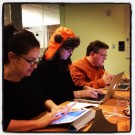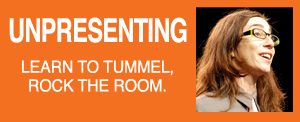Recent Episodes
An Experiment: The psychic impact of our connected lives
 During the past week I conducted an experiment in digital empathy.
During the past week I conducted an experiment in digital empathy.
Background
As many of you are aware, I am obsessed with the potential of enabling and integrating our digital 1/0 lives into our human emotive sides.
I don’t just want a quantified self I want a qualified self.
Giving me more numbers and graphs and charts can be helpful but providing me with more things to compete over does nothing to enhance my joy and presence with others or provide me with the tactile and unmeasurable benefits from getting a hug or whacking a table with a boomwhacker [as I recently observed when over 200 geeks gleefully demonstrated at YxYY].
We have a long way to go in how we think and design tech to enhance our lives, maybe it’s a silly and impossible goal and we shouldn’t even try. However, as someone who loves, lives and breathes tech and believes that the stuff we can’t often measure is where the human spirit lives, I think it is worth a try.
Situation
Three major events pulling me in a roller coaster of emotion.
Two weeks ago my Facebook feed become ground zero for demonstrating the psychic and emotional schism of our connected lives. My feeds where filling up with comments, conversations and reactions from three very distinct events:
- YxYY: Enthusiastic preparations by over 400 geeks and creatives as they anticipated the second year of YxYY. As one of the co-founders of YxYY, my heart swelled as I saw all the amazing projects and enthusiasm about to be unleashed over three days in Palm Springs. I was proud and excited and content.
- At the same time, the turmoil between Israel and Gaza was picking up and my friends and family in Israel were running for cover from rockets raining down on them. As I read each post, my heart sunk. I was angry, sad depressed and frustrated – feeling impotent in how to empathize from so far away with my second home and also filled with the stress and fear, anger and sadness that accompanies living in a state of war.
- World Cup – a distraction an emotional release with a beginning, middle and end to each match – cathartic and global and physical and fun. Particularly, because the matches this year demonstrated great sportsmanship between players and the best the sport has to offer the world. There was even a running joke on the day of the Brazil vs Germany debacle on how ‘Israelis are calling Brazilians to see if they are OK’.
Post YxYY the turmoil in Israel was a full fledged ground war and for every beautiful photo and post I liked and commented on from new friendships born at YxYY, there was another post on a funeral, someone called up to fight and the moral debates and toll of civilian deaths in Gaza. My world had gotten very small and very dichotomous. It was an extreme example and observation of what we all live in the midst of on a constant basis as we each deal with the mini “emotional yeahs and neighs” that fill our digital lives in a constant stream.
Experiment
So, I did the least logical thing – I decided to jump into the deep end of the pool and I downloaded the Red Alert app. [Red Alert was created for Israelis to warn them of rocket attacks. You can find plenty of stories about it around the Net]. I wanted to see if I could feel a different sort of empathy – an in the moment sense of what living under rocket threat and war feels like. Could this app – stripped of the physical boundaries it was created for impact me and how? For the past week, I have gotten all red alert notifications on my phone.
Observations
- I was stressed. At first, it was traumatic – every 30 seconds another notice – my stress level went through the roof even as I sat alone on my couch in San Francisco. What would it be like if I lived in Ashkelon and had to physically run for my life this often?
- Would an app like this be helpful to the media in this or other situations? It is always difficult to report on “non-events” if reporters not in based in Israel had Red Alert would they understand the impact without the ‘death/injury numbers?
- Can we design other apps that enable empathy and catalyze people to action in other ways?
- This experiment was also a cautionary tale. By the end of the week, I started to get a bit numb – with no real impact on my life, the alerts became an annoyance [of course part of this is the design of the app – needs more finesse – even my israeli friends had to turn it off.
- The app highlighted a need for those from afar to connect to thos e in stress. I want to be able to connect and reach out to specific friends, people – to engage them during hard times not just empathize alone on my couch
Takeaways
What does all this ‘connectedness yet oddly disconnectedness’ do to us on a regular basis – this may be an extreme moment in time for me personally, but we are all constantly managing this state of being – no wonder we often feel stressed and at odds. This is not simply about ‘Information Overload’ or ‘Getting Shit Done’ or ‘Inbox zero’ – it is about the type and nature of the information that flows passed us.
- When news and information are not just an intellectual exercise, how do we handle it?
- Are we psychically wired to deal with so much and such radical shifts in our emotive state?
- How can we build better tools to help us deal with this in positive proactive ways?
- Can we build these tools with a knowledge of not just empathy but action and emotional connection and support?
Ironically, during my experiment, I read that the Yo! app built as a joke [think of it as a global internet based “poke”] that I often made fun of as a sign of social media jumping the shark – is potentially integrating with Red Alert. Amazing. The fact that a lightweight joke app designed to ping a friend can integrate with a practical highly functional app like Red Alert so that I can send a supportive note to a friend thousands of miles away in a bomb shelter, is a good sign indeed for the future of our psychic connected selves.
In emergencies my coping mechanism is action, I am a problem solver and a doer and it helps me deal with the emotion – I need to act. This experiment had given me pause to think about an entirely new area of apps – call em – digital empathy catalyzers. These tools not only enable us to connect but perhaps to feel and act.
I am hopeful. I have no other choice.
Originally posted on my blog
[Note: This post is meant to take a look at emotional dichotomy and its impact on our digital lives, it is not a forum for political discussion. As I have stated online numerous times, I rarely post about Israel because the situation is complex and I don’t think the Net is the best place to have civil dialogue on a complex topic fraught with emotion And yes, I am conscious of the irony of this as it relates to this post].
TummelVision on (short, we hope) hiatus
hi gang,
We’re putting the show on hiatus so we can improve infrastructure and evaluate network opportunities. That’s the concise way to say we want our production process to work as well as possible, so there are minimal delays for you in getting your shows. We also want to bring the show to more people. Many thanks to all our listeners, guests, people we learn with and especially our loyal crew joining us live every week. We’ve got some great stuff coming but would also love your suggestions and anyone you think we should be talking with.
We’re excited for what’s next.
xoxo debs, kevin + heather
Tummelvision Episode 104 – Flickr’s Yahoo-Flavored Downfall and Other Acquisition Fails (with Michael Petruzzo cameo)
Episode Notes
Debs is on vacation and Kevin has just returned from the Privacy Identity Innovation Conference! Heather and Kevin use Mat Honan’s article about Yahoo’s missteps with Flickr as a lense to discuss the multitude of acquisition blunders.
Why don’t boards of large companies understand the value in making something good? Why does the focus almost always shift from nurturing an innovation to profit and scale? What made Flickr so great and why did the acquisition halt this greatness so abruptly?
Aspiring #tummel nerd Michael Petruzzo makes his first cameo on the show!
How Yahoo Killed Flickr And Lost The Internet – Mat Honan
Tummelvision 103 Kio Stark: Stranger Studies, Incubating Emotions and Naming Lipstick Colours
Podcast: Play in new window | Download
Episode Notes
Kio Stark stops into Tummelvision to discuss – you guessed it – how people relate with & to technology! Kio teaches about human social dynamics at NYU’s Interactive Telecommunications Program.
Topics include Kio’s ITP syllabus, “bro-gramming”, Zuck’s hoodie, instruments for triangulation, systems of acknowledgement and the tower of Babel that comes from an outward-focussed web.
The group makes a very important distinction that what draws most people online is connectivity – not just information – and that we are in the “nursery school” stage of development as far as building social spaces that work online.
Tummelvision Episode 102 with Lukas Blakk – Lesbian Feminist Organizing, Open Source Community and Privilege
Episode Notes
“Community is the people you’re stuck with.”
-Lukas Blakk
Lukas Blakk from Mozilla joins us for an exciting discussion about what constitutes actual community – and it’s not just sharing interests.
Lukas defines “community” – a word she finds is diluted of meaning – from her point of view: being raised in a Lesbian household, actively organizing around GBLT issues and now working with volunteer engagement at Mozilla. The question of privilege arises, as for Lukas community was defined as people who rallied around something and came out the other side together. When joining Mozilla, she really had to find things to care about in open source like she “cared about feeding lesbian women in the woods” (rather than just Java vs. Python).
Highlights of this episode include: the illusion of meritocracies, similarities between Milliken Conference (Wealthy 1% conference which Deb just returned from) and the Michigan Women’s Music Fest, the political implications of forking some code and the end of zero-sum games in a networked world.
Straight White Male: The Lowest Difficulty Setting There Is | John Scalzi








